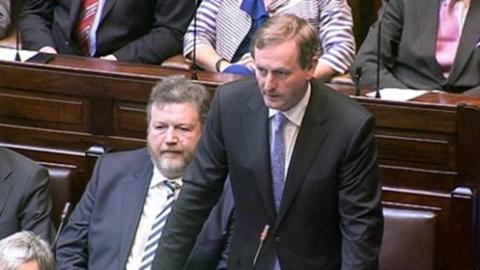Electorate voted for change but got more of the same

Remember all the promises before the election about new politics, more openness, real debates and proper accountability? This past week we have been given a flavour of what this new politics, openness, accountability and all that are really about, writes Vincent Browne.
On Tuesday last Gerry Adams asked Enda Kenny about the government's acceptance of the EU-IMF deal, as compared with what was said in the Fine Gael election manifesto. Gerry Adams said Enda Kenny had claimed during the election campaign: "The current EU-IMF bailout deal is bad for Ireland and bad for Europe, that the financial markets are closed to Ireland principally because investors are concerned that any further capital injections into the banks will sink the economy." Now, a few weeks later, Enda Kenny was saying the opposite and Gerry Adams wanted to know why.
Enda Kenny avoided the question.
Later on Tuesday, a motion was tabled by Independent TDs calling for a referendum on the EU-IMF deal. Richard Boyd Barrett said that in February Fine Gael stated it was morally wrong and economically unsustainable to ask the people to beggar themselves to enrich speculators and profiteers. He asked what has changed because now we were asking the people to beggar themselves even more by paying of a further €24 billion to the banks and, incidentally, the total cost of this to society will be about €104 billion.
Stephen Donnelly, the Independent TD for Wicklow said, "Had I voted for either Fine Gael or Labour, which of course I did not, I would be pretty sure I was voting for a major push-back on the bondholders. Last week, however, we discovered this was not to be. We discovered that, when it comes to paying unguaranteed senior bondholders, the new Government's policy is to continue Fianna Fail's policy."
He said the total cost of the bank bailout would be €105 billion, or over €80,000 per household. "As we are borrowing that money at 6 per cent, this means every household in Ireland is paying €5,000 a year just to service the interest on these debts. For the Irish people to pay back €105 billion of private losses would be the equivalent of the French paying €1.3 trillion or the Germans paying €1.6 trillion."
Stephen Donnelly's comments were followed by a speech from Brian Hayes, a junior Finance minister. After he was finished Donnelly remarked that Brian Hayes had not said a single word in relation to the motion which was calling for a referendum on the EU-IMF deal. Nor did Brian Hayes or anybody else on the government side even address the conflict between what they promised before the election and what they were doing now.
Brian Lenihan said that what the government had done on the banks was "a successful first step because the Minister has built on the policies of the previous Government...The outlines of this (Michael Noonan's) speech can be clearly derived from the EU and IMF agreement concluded last winter. There is nothing in that agreement, arranged with the previous Government, that is not implemented in the Minister's current policy...I notice that last week he referred to the guarantee of 30 September 2008 but the Minister has now given a more extensive guarantee than occurred on that night. That guarantee lapsed on 30 September 2010 and when it did, a large amount of bank bonds became unguaranteed. The Minister has decided, through capital reassurance, that those bonds should be honoured and paid in full. That is the effect of the Minister's announcement last Thursday and it is confirmed today. We should not speak of disastrous guarantees when the Minister has given a broader guarantee than that given by the previous Government."
Nobody responded to his point.
Mick Wallace, the Independent TD for Wexford said: "Fine Gael Party and Labour Party Members should have the courtesy of bowing to Deputy Lenihan when they meet him in the corridor because they seem to agree with absolutely everything he had to offer."
On Wednesday, in a continuance of the debate on the motion calling for a referendum, Michael Noonan said, "There is no doubt that the bailout will impose a heavy debt burden on Ireland for many years to come." He said the government's initiatives on the banks had begun to create confidence that Ireland could survive this crisis and were the government to yield to the demand for a referendum it would damage the emerging confidence and would be interpreted as a weakening in the resolve "regarding its commitments to the bank bailout and the EU-IMF programme", commitments which he derided a few weeks previously during the election campaign.
For the most part the Dáil chamber was almost empty during the debate. Nobody on the government side bothered to engage in any of the points made by opposition speakers.
A government motion denying the referendum option won by 119 votes to 27. Most of the 119 TDs who voted down the motion on a referendum heard the arguments in favour of a referendum, heard the speeches about how the electorate voted for change, but got the same again.
Note: Due to an editing error this piece originally stated that Mick Wallace was an Independent TD for Wicklow. Wallace is a TD for Wexford; this has been corrected in the text.
